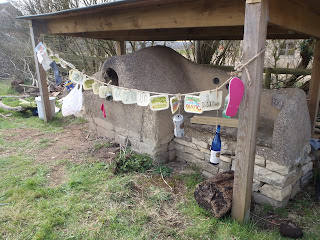We were visited by pupils from Holymead Primary School for a 'Sustainability Day' at Folly Farm.
 |
| The mystery bags of soil components |
What does sustainability mean? We asked this question at the start of the day... by the end of the day we all had a better understanding of 'sustainability' and how we can all help to live more sustainably! Here is an insight into some of the activities:
Rotters Restuarant
 |
| Creating menus for Rotters Restaurant! |
It takes about 1000 years for an inch of soil to form. Each pupil took it in turn to bravely put their hands in mysterious bags to try and guess the components of soil. It is so important ... think about it... what would we eat if there was no soil!!! Everything depends on soil: vegetables, fruit trees, rice, wheat, farm animals, even fish!
We took a trip to ROTTERS RESTAURANT for the 'best grub in town!' Here we asked the class to create menus for a selection of diners such as beetles, bugs, worms and spiders .
Have a listen to some of the menus:
Rotters Restaurant Specials by Avon Wildlife Trust

Rotters Restaurant Specials by Avon Wildlife Trust
We learnt that the woodland floor is an abundant 'restuarant' that a wide variety of organisms rely on... although most who dine here may end up on the menu too!
 |
| Nature detectives |
Exploring the Orchard Ecosystem
We have orchards at Folly Farm, which are home to a variety of wildlife. Picture cards of some of this wildlife were hanging in the trees: honey bee, hedgehog, horseshoe bat, flycatcher, tree blossom - to name a few!
The class had to become nature detectives to find all of the pictures and match them up to appropriate descriptions about the behaviour, habitat, diet and important roles of the species in the orchard.
 |
| Exploring in the orchard |
Then things got a bit muddier as we searched for mini beasts in the orchard. Spiders, worms, beetles, earwigs and woodlice were all found. So many organisms use the orchards, rely upon each other, and each have important roles in supporting the habitat. A great example of the balance of nature!
 |
| Mini beast hunt |

Something that you may not think about is what happens to our rubbish when we throw it away? Well, we know it gets taken to landfill- but then what?! How quickly does 'stuff' decompose? The children tried to work this out! We had a pile of rubbish containing flip flops, cans, paper, glass, plastics and food waste. The class had to try and put into chronological order how long it takes for this rubbish to decompose. We were all very shocked at how long our rubbish takes to break down once it is in landfill, for example, 1,000,000 years for glass to decompose ... around 80 years for an aluminium can... the problem of plastics that are not biodegradable and end up polluting oceans and harming wildlife!
This activity really hits home the importance of the motto 'reduce, reuse, recycle'! Reducing how much waste we produce in the first place, reusing what we can and recycling what we cannot!
Take a look at our Folly Farm Learning Brochure to see what your class could discover during a day class or residential trip!
Click here for more info about learning programmes at Folly Farm.
You can always get in touch for more information. P lease contact: Julie or Jo: 0117 917 7270 or email schools@avonwildlifetrust.org.uk
Follow us on Twitter @wildschools


No comments:
Post a Comment